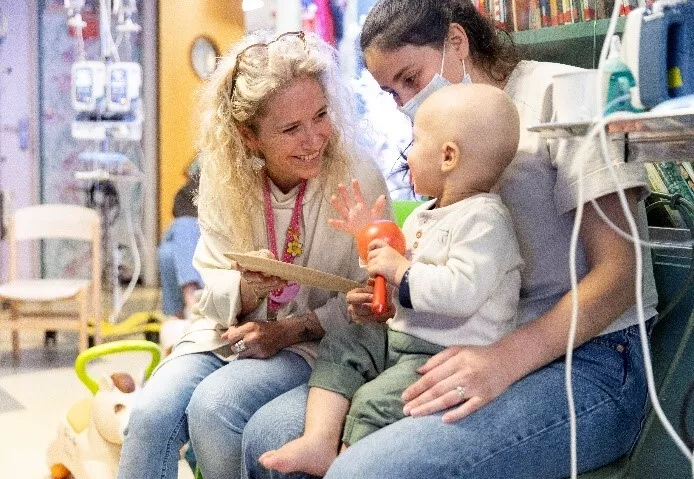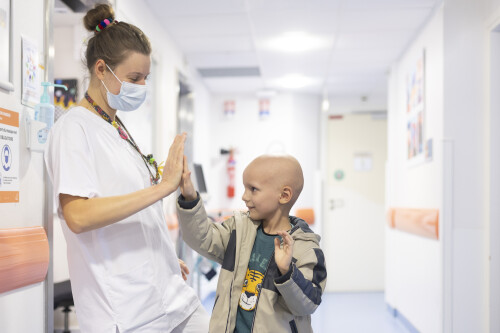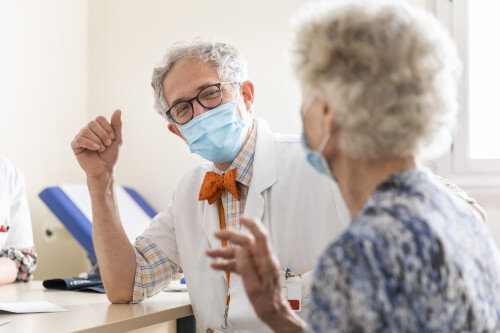" At the heart of Institut Curie hospital, the paediatrics department is a bubble of its own, full of emotions, often joyful. Our team is guided by a deep determination to ensure continuity in the lives of children and support for families on all levels, psychological, social, educational, etc. during this very special period from diagnosis to the end of treatment," explains Dr. Daniel Orbach, Director of the Clinical Department of the SIREDO Center of Institut Curie (care, innovation, research in the field of oncology in children, adolescents and young adults). This human support endeavor is successful thanks to the involvement of professionals from various backgrounds - including the tremendous support of highly invested associations - who work together for the health and well-being of children ".
A team that cares
From the moment our nurses welcome the patients, the professionals of the SIREDO center of Institut Curie work hard to provide personalized and collaborative care. "The children and their parents are received by the pediatrician who will become their referent, and then one of the main nurses joins in to provide support to the young patient and their family," explains Marjolaine Renouard, senior nurse. The medical assistants also participate in all consultations, thus constituting one more point of reference for the children and their relatives."
During this first stage, the main nurse devotes themselves fully to the new patient and guides them through the different appointments of the day. Then, over the course of consultations and hospitalizations, each professional brings their expertise and benevolence to the table.
... a number of involved professionals
"Childcare assistants create very strong bonds with children, which allows them to distract them and reassure them during treatment," explains Marjolaine Renouard. At the same time, ASHs (hospital service agents) are working to improve children's meals. They also help mitigate the emotions that families are faced with outside of treatment times."
The list of professionals working jointly in pediatrics is very comprehensive - psychologists, psychiatrists, dieticians, physiotherapists, psychomotor therapists, etc. Every Tuesday, they meet together, whether they are caregivers or not, to talk about patients, discuss their needs and, thanks to their teamwork efforts, find solutions to address them.
The key role of educators
Clowns, storytellers, musicians, digital workshops, visual arts, baking, sports and hands-on activities - and so on and so forth. Two SIREDO educators plan regular visits of professional or volunteer associations who take turns at the bedside of children aged 0 to 15.
"It doesn't matter how many children participate in the activities. If entertainment does good to even one of them, then it serves its purpose," insist Emmanuelle Malarmey and Nathalie André, educators of young children. Young patients also have access to a large playroom where a sick child becomes just a child all over again. "None of the activities are mandatory," they specify. We make sure not to put additional constraints on either children or parents. We are here to offer them freedom to choose. "
School: avoiding any risk of dropping out
Another greatly reassuring service for families: school at the hospital. Two teachers from the National Education Department take turns providing educational services to children over the age of three who are in long-term hospital care, with the classes taking place either in the equipped classroom or at the patient's bedside. "They come every day to see each of them and adapt their classes to their needs, their state of health, and their level of motivation," specifies Anne Redzic and Jeanne Pierre. Since Institut Curie is also authorized as an examination center, young patients can sit for their certification or baccalaureate there during hospitalization.
Providing teens with a reason to get up and prevent them from turning inward on themselves
Twelve years ago, Institut Curie created the AJA (Adolescents and Young Adults) unit, dedicated to 15-25 year-olds – one of only three of this type in France. It has six beds and treats about a hundred patients a year.
"While at this age, as they transition from adolescence to adult life, the disease cuts their wings. We are here to be their parachute," says Sandra Quie, facilitator at the AJA unit. We come to see them regularly in their room, to informally discuss anything that may concern or interest them."
Pancake nights, concerts, video or board games, hands-on activities, outings, etc., every means is implemented to give them a reason to get up and prevent them from withdrawing into themselves. "They can also always say no and choose not to participate; it is important to respect their decision and to give them a little control over their own lives while the disease takes away a lot from them," specifies the facilitator.
An internal survey has revealed that just knowing that they are not alone, that there are other young people around them who are experiencing or have experienced a similar situation, improves the well-being of young patients.
Once their treatment is complete, the connection is maintained with the help of the unit's smartphone, which allows the young patients to stay in touch with the team. "Whether it's managing fatigue, risk of depression, or school or housing difficulties, we continue to search, on our own or in collaboration with associations, for solutions that could help in that matter," adds Sandra Quie.

Innovative solutions to facilitate care
How to reassure or distract a child before and during treatment? The professionals of the SIREDO center have several tricks up their sleeve. A virtual reality headset, for example, immerses the children in another world during a blood test or a chemotherapy session. Some caregivers are trained in hypnosis while the psychomotor therapist teaches patients relaxation techniques. Nurses, meanwhile, use homemade dolls to demonstrate complicated procedures to children and parents, such as inserting a central line or a gastric tube. The goal is to succeed in making the treatment a game for the children.
In addition, side effects such as skin and nail problems are common in young patients treated for cancer. "I always explain to them what side effects to expect. I give them the tools to cope with them and the tips to prepare their skin in advance," says Hedi Chabanol, podiatrist at the Wounds and Healing Research Unit of Institut Curie. For example, to take care of their nails, I use a cryotherapy pen that the children have renamed the "Snow Queen pen"! By introducing play into the treatment, which is also not painful, we make them want to participate and they become requestors of this treatment.
|
With Snoopy, there is no shortage of dog care  Big tender eyes, drooping ears, a black spotted coat: meet Snoopy, the mediation dog from Institut Curie who regularly walks around in the pediatric department, where he is rather popular for his very effective cuddle therapy moments. "The benefits of the relationship with the animal for anxiety or pain are evident. Snoopy is there all day at Institut Curie. He is an iconic pillar of support for the children - a supportive companion on the way to the treatment room, a moment outside of the treatment that feels good, that reassures and encourages them to return to the hospital," explains Hedi Chabanol, one of Snoopy's five referring caregivers (Wounds and Healing Research Unit, directed by Isabelle Fromantin). "He motivates teenagers to get dressed up and go out and spend some time with him. Since last September, he has even been used as a model for children's drawings during the visual arts workshops of the NOC association (Nous On Crée - We Create!)." |
Long-term financial and social support
"This is something that makes our service stand out and something we are attached to: I meet, systematically and from the beginning of the course of care, each family welcomed at the SIREDO center to identify their needs in terms of financial support. I try to help the family to arrange their lives as well as possible from a social point of view throughout the treatment process, which can be spread out over several years. I adapt to the individual situations of families with always the same idea in mind: to find the best adapted social solutions for each of them," explains Sandra Toscani, social worker at Institut Curie.
She has a whole arsenal of resources to supplement the coverage of Social Security and/or mutual insurance (for example, for financing psychomotor therapy sessions, purchase of hair prostheses or even basic necessities for families in precarious situations).

Some options include public channels, such as the Family Allowance Fund or the Departmental House for Disabled People, as well as associations specific to Institut Curie: The children of Curie-APAESIC or Retinostop. As for the organizational aspect, Sandra Toscani insists on the importance of an adapted and continued social monitoring: "The objective is to allow parents who wish to balance their employment with being by their children's side in the course of the treatment, while helping them to take care of the rest of the siblings and family projects." The social worker helps juggle the arrangements, such as parental presence, to best support the process desired by each family. She can also rely on Institut Curie's Irène Joliot-Curie Parents' House, which offers 10 rooms with shared kitchen to help accommodate relatives coming from afar during radiotherapy phases, for example.
Key figures at Institut Curie
- 390 new patients per year
- SIREDO, the 1st integrated center in France dedicated to cancers affecting people under 25 years of age
- 43 clinical studies in 2022 including 100 children and teenagers
Associations: essential support at all stages
To learn, create, play, escape, to help financially or to support research in pediatric oncology, the role of these very numerous and, above all, very committed associations is extremely valuable. At Institut Curie, more than 40 associations provide support to sick children and their families.
Some of them are historical. This is the case of Retinostop, the French association against retinoblastoma, cancer of the retina of young children, for which Institut Curie is the national referral center. Providing information and support to families, raising awareness among health professionals and the general public, research support, etc. - the association has been working on all fronts for more than 30 years. "Our role is to support and help families and patients. Each of our missions constitutes a lever to offer the best chances to children affected by this rare ocular tumor," explains Marie-Françoise Ray, CEO of Retinostop.
Another emblematic example: for more than 20 years, the NOC association! (Nous On Crée - We Create!), the art school in the hospital,offers visual arts workshops at Institut Curie with a structured framework for learning and creativity for children who have broken away from a "classic" childhood. "Much more than a hobby, artistic practice makes it possible to maintain essential educational habits despite long periods of hospitalization, while cultivating self-confidence, curiosity, and technical skills," explains Elodie Thebault, founder and director of NOC!
The Children of Curie - APAESIC association, which is celebrating its 40th birthday this year, provides extremely valuable support to families: "It's about meeting the needs of children, to make their life in the hospital as stress-free as possible, with weekly activities to distract them: clowns, knitters, music workshops, storytellers, festive snacks, etc. We also provide financial assistance to the most vulnerable families in collaboration with the department's social worker, or by providing organizational support. Because children with cancer are in a long fight that often upsets the family and professional balance," emphasizes Aurore Goncalves, President of the Children of Curie.
Meanwhile other essential associations carry out awareness-raising activities with public authorities and finance important research projects that encourage innovation and medical advances in pediatric oncology.
For more information,
- The SIREDO Center https://curie.fr/siredo-centre-expert-en-cancerologie-de-lenfant-et-de-ladolescent
- November 28, 2024 EU CAN KIDS: sustainable European alliance for a future without pediatric cancers
- September 10, 2024 Progress in the understanding of childhood cancers to cure more young patients, a...
- August 27, 2024 Pediatric cancers: Heloise Courvoisier, eyes on the games
- August 27, 2024 A month to raise awareness of the fight against pediatric cancers, the 2nd leading cause of death in...
- July 8, 2024 Pediatric cancer: the origin of the medulloblastoma detected, renewed hope
- April 10, 2024 Pediatric oncology, anti-cancer vaccine: the promising results of Institut Curie presented at the AACR congress
- February 12, 2024 Pediatric brain tumors: the innovations of Institut Curie towards new therapies and fewer...
- December 18, 2023 Institut Curie is modernizing, regrouping its forces on its Parisian site and building the premier...
Press contacts
Catherine Goupillon-Senghor - catherine.goupillon-senghor@curie.fr/+33(0) 6 13 91 63 63
Elsa Champion – elsa.champion@curie.fr/+33(0)7 64 43 09 28
About Institut Curie
Institut Curie, the first French center for the fight against cancer, combines an internationally renowned research center and a state-of-the-art hospital group that takes care of all cancers, including the rarest kinds. Founded in 1909 by Marie Curie, Institut Curie brings together on its three sites (Paris, Saint-Cloud, and Orsay) over 3,800 researchers, doctors, and caregivers who are all dedicated to work towards completing its three missions - care, research, and teaching. Institut Curie is a charitable foundation authorized to receive donations and bequests. Thanks to the support of its donors, Institut Curie is able to speed up discoveries, thereby improving treatments and the quality of life of patients. For more information: curie.fr, Facebook, LinkedIn, Instagram, BlueSky



